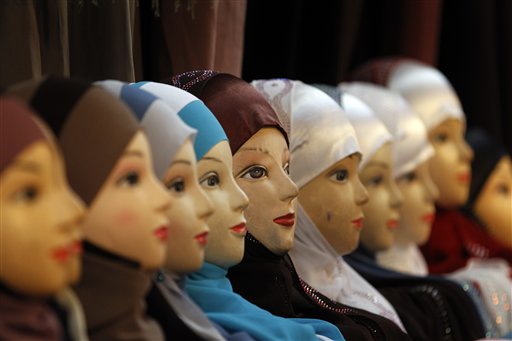(AP) Many countries impose restrictions on Muslim veils
By The Associated Press
Many countries and courts have taken action over the past decade to regulate, restrict or ban the use of Muslim veils and headscarves in public. Here is a look at the issue around the world:
_ BRITAIN: There are no laws restricting the use of Muslim veils. But a London judge this week ordered a defendant on trial for witness intimidation to remove her niqab when testifying, so that he and the jury could see her as she answered questions. Judge Peter Murphy also called on the government to draft a law making it illegal for witnesses to cover their faces in court.
_ FRANCE AND BELGIUM: In April 2011, France became the first European nation to ban the public use of veils, both face-covering niqabs and full-body burqas. A 2004 law also bans Muslim hijab headscarves and other prominent religious symbols from being worn in state schools, but does not apply in universities. Belgium followed France in banning the wearing of niqabs and burqas in public in July 2011.
_ ITALY: Since the 1970s Italian law has forbidden the covering of the face in public. Governments have repeatedly discussed extending the provision to impose special penalties on Muslim face coverings, but such laws are not enforced nationally.
_ GERMANY: Has no national law restricting the wearing of Muslim veils, but the federal constitutional court in 2003 ruled that state governments could impose such restrictions on school teachers. Half of Germany’s 16 state governments today outlaw the wearing of both headscarves and veils by teachers. In 2011, Hesse became the first German state to forbid all civil servants to wear Muslim headscarves or veils.
_ SPAIN: Since 2010 more than a dozen cities passed laws outlawing the wearing of niqabs and burqas in public. But Spain’s Supreme Court in February 2013 threw out these ordinances as unconstitutional.
_ NETHERLANDS: The country’s previous center-right coalition had planned to ban the public donning of niqabs and burqas, but that bill was shelved in 2012 when the government collapsed and was replaced by left-wing rivals.
_ CANADA: In 2011 the government made it illegal for women to wear face-covering garments at citizenship ceremonies, because the judge must be able to see each person’s face reciting their oath. In 2012 the Supreme Court issued a rare split decision on whether women could cover their faces on the witness stand; four judges said it depended on the circumstances, two said witnesses should never cover their face, and one said a Muslim witness should never be ordered to remove her veil. The provincial government of French-speaking Quebec this year has proposed a law that would outlaw all religious regalia _ including Muslim scarves and veils, turbans, Jewish skullcaps and Christian crucifixes _ from state buildings.
_ UNITED STATES: America has no laws restricting the use of veils or headscarves because it conflicts with constitutional rights to freedom of speech. In 2009 President Barack Obama said in a Cairo speech directed at a Muslim audience that Western nations should “avoid dictating what clothes a Muslim woman should wear” because it reflected innate hostility to Islam.
_ TURKEY: Islamic-style headscarves and full robes are banned in schools and in government offices. A similar ban for university students was relaxed.
_ TUNISIA: Headscarves and full veils are banned from public buildings and schools. After the longtime president was ousted in a popular revolt in 2011, some Islamist protesters have demanded that the rules be relaxed.
_ SYRIA: In 2011, Syrian President Bashar Assad reversed a decision that bans teachers from wearing the niqab. The move was seen as an attempt to appease religious conservatives in the Sunni majority as he faced down the uprising challenging his authoritarian rule. The government had banned the veil in July 2010.

COMMENTS
Please let us know if you're having issues with commenting.